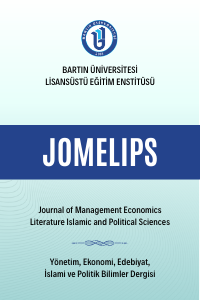Pavlus Hristiyanlığından Protestan Evanjelizmine Misyonerlik Süreci
Temel anlamda misyonerlik, Hristiyan dininin bütün dünya coğrafyasına hakim olma fikrinin sistematik bir şekilde günümüzde anlam bulduğu bir kavramdır. Hz. İsa’nın Allah’tan aldığı mesajı içinde bulunduğu topluma iletmesi ile başlayan İsevilik (Hristiyanlık), daha sonraki dönemlerde takipçilerinin nakil yoluyla kendi eklemeleriyle çok farklı bir hal almıştır. Özellikle Hz. İsa’dan sonra onunla hiç karşılaşmamasına rağmen onun dilinden bir çok şey söyleyen Pavlus ile birlikte Hristiyanlık bambaşka bir görünüme sahip olmuştur. Bu noktada Pavlus Hirstiyan toplumlarda Hristiyanlığın mimarı misyonerliğin ise fikir babası olarak kabul edilemktedir. Pavlus sonrası dönem Hristiyanlığın Roma İmparatorluğu tarafından devletin resmi din olarak kabul görmesiyle dünya genelinde daha geniş bir sayıya ulaşmıştır. Yakın tarih sürecinde ise Hristiyanlar arasında ayrılıkların başlaması ve Protestanlık adıyla bilinen mezhebin ortaya çıkışı bu dine yeni bir anlam yüklemiştir. Protestanların dünya geneli misyonerlik faaliyetleri sadece dini misyonla sınırlı kalmayıp bulunduğu ülkelerde yönetim adına da söz sahibi olmasını elverişli hale getirmiştir. Bu noktada misyonerliğin siyasi ve dini anlamda geldiği en son nokta Protestan akımların tek bir çatı altında buluştuğu Evanjelizm olmuştur. Söz konusu çalışmada, Hristiyanlığın başlangıcından günümüze kadar uzanan süreçte geçmiş̧ ve günümüz misyonerlik anlayışı irdelenmeye çalışılmıştır.
Anahtar Kelimeler:
Hristiyanlık, Misyonerlik, Pavlus, Protestan
Missionary Process From Christianity Of Paul To Protestant Evangelism
In a general terms, missionary is a systematic concept of Christian religion that dominates the whole world's geography today. The Christianity, which started with the collective communication that Jesus had received from God, was very different from his own attachments in the later periods by the transfer of his followers. Especially Christianity, with Paul, who said many things from his language, although he had never encountered him after Jesus, had a totally different appearance. At this point Paul is considered as Christianity's architecture and the father of ideas’s missionary in Christian societies. The post-Paulic period has reached a wider range of the world since Christianity is recognized by the Roman Empire as the official religion of the state. In the recent history, the beginning of the divisions between the Christians and the emergence of the sect known as Protestantism have given a new meaning to this belief. Protestants’s world-wide missionary activities have made it possible to have a say in the name of governments in countries where they are not limited only to religious missions. At this point, the last point of the missionary's future in political and religious terms has been evangelism, which the protest movements are under one roof.In this study, it was tried to examine the understanding of the past and present missionary in the process ranging from the beginning of the Christian to the all-time.
Keywords:
Christianity, Missionary, Paul, Protestant,
___
- Prof. Dr. Ali Coşkun Marmara Üniversitesi İlahiyat Fakültesi Din Sosyoloji Ana Bilim Dalı
- Başlangıç: 2016
- Yayıncı: Bartın Üniversitesi
Sayıdaki Diğer Makaleler
İslam Ekonomisinde Sigortacılık ve Mülkiyet Üzerinde Bir Analiz
DESTİNASYON KARAR VERME SÜRECİNDE RİSKTEN KAÇINMA VE YENİLİK ARAMA DAVRANIŞI ARASINDAKİ İLİŞKİ
Aytuğ ARSLAN, Hakan BOZ, Özer YILMAZ, Burçin BOZ
Pavlus Hristiyanlığından Protestan Evanjelizmine Misyonerlik Süreci
Finansallaşma Sürecinde ABD’de Yükselen Popülizm
Mehmet VATANSEVER, Orhan BATMAN, Aysu ALTAŞ
Mavi Okyanus Stratejisi: Dünyadan ve Türkiye’den Örnekler
Süleyman AĞRAŞ, Fırat ATBAŞ, Enes ŞEYBA
